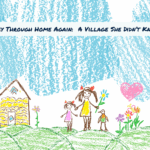The Power of a Story
Hello, my name is Robyn, and I work in marketing at Harvest House. Recently, I sat in as our Home Again Luncheon guest shared her story with Erin in preparation for the event. As I heard her speak, I experienced a range of emotions that I hadn’t felt before, or perhaps emotions that appeared similar but felt distinct. This made me ponder on the impact of storytelling. Does it only elicit pity, or is there more to it? What are its benefits?
This year’s theme is “Rebuilding the Village.” I became curious to explore how this remarkable and inspiring story can be more than just one young woman’s journey of reclaiming herself. I wanted to discover how this story can impact rebuilding her village.
Stories have always been an integral part of human communication. Whether an ancient myth or a modern-day movie, storytelling can move, inspire, and unite us. But what is it about stories that make them so compelling? How do they affect our brains and our emotions? This article will explore the power of a story and its impact on our lives.
Neuroscience suggests that when one person tells a story, and another person listens to it, their brain patterns begin to mirror each other. This connection goes beyond an emotional level and extends to a physical level.
On functional MRI scans, many different areas of the brain light up when someone is listening to a narrative, not only the networks involved in language processing but other neural circuits, too. Interestingly, storytelling engages both sides of the brain. When we watch our favorite characters fighting for their life on screen, we feel fear and anxiety as if we were the ones being attacked. This is because their emotions are reflected in the mirror of our neural wiring. The characters’ actions and emotions are mapped onto our brain’s sensory representations.
“As you hear a story unfold, your brain waves start to synchronize with those of the storyteller,” says Uri Hasson, professor of psychology and neuroscience at Princeton University. This synchronization creates a deep connection between the storyteller and the listener, allowing them to share a moment in time and space.
Hearing someone’s story allows us to reap some of the wisdom and life lessons.
According to Clare Patey, the director of The Empathy Museum, “Stories have a transformative power to allow us to see the world in a different way than we do if we just encounter it on our own. Stories are an entry point to understanding a different world experience.” In this way, stories transcend facts and figures and widen our worldview.
Similarly, telling our story allows the storyteller’s brain to receive feedback that can bring healing and validation that would have never been available if their story had never been told.
In conclusion, stories can move, inspire, and connect us. They can change our brain patterns, broaden our horizons, and expand our understanding of the world. Whether telling our own stories or listening to someone else’s, we can connect with others on a deeper level and gain insights into our lives.
On February 28th at 11:30 am, we will be given a chance to listen to a story that can transform some of our opinions and thinking and empower us to participate in being part of the village that can impact our community.
Please consider joining us and invite friends to hear one client’s inspiring story.
For more information about the event, to purchase tickets, or to become a sponsor, please visit 2024 Home Again Luncheon Tickets and Sponsors.





